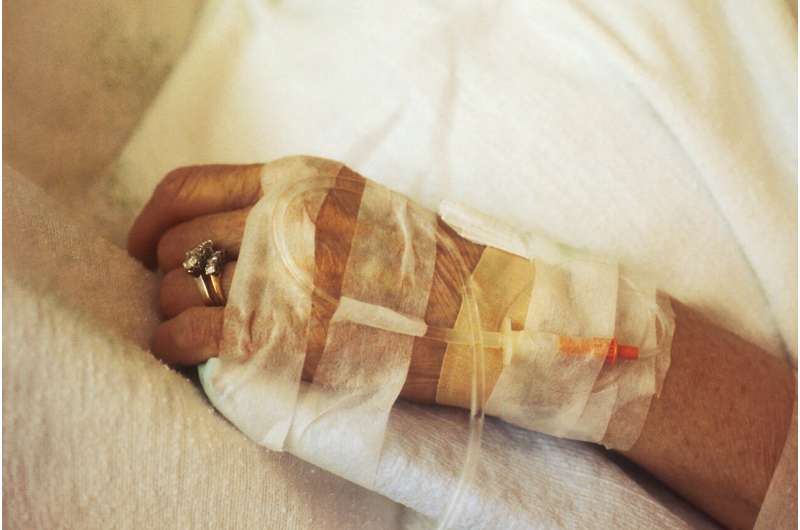This article has been reviewed according to Science X's editorial process and policies. Editors have highlighted the following attributes while ensuring the content's credibility:
fact-checked
trusted source
proofread
Breast cancer patients with higher BMI more likely to experience heart damage during chemotherapy, study finds

Breast cancer survival rates have improved considerably in the last few decades in Colombia, but factors that increase the likelihood of patients experiencing cardiovascular side effects, like cardiotoxicity, are not well-known or well-treated.
A recent study in the North-East region of Colombia found 11.94% of patients with a high BMI being treated for breast cancer at a regional center experienced heart damage, or cardiotoxicity, during chemotherapy. The study will be presented at the American College of Cardiology (ACC) Latin America 2023 Together with Asociación Costarricense de Cardiología in San Jose, Costa Rica.
"Cardiotoxicity is a relatively recent concern in cancer care, and its recognition as a significant issue is still evolving. In regions with limited research infrastructure and resources, there may be a lack of specific studies or initiatives addressing cardiotoxicity in the context of breast cancer treatment," said the study's lead author Ivetteh Gaibor Santos, MD, an internal medicine specialist at Universidad Autónoma de Bucaramanga/Fundación Oftalmológica de Santander-Foscal in Bucaramanga, Colombia.
An anonymized database of breast cancer patients who started chemotherapy with doxorubicin or trastuzumab between January and December 2021 was used for the study. The analysis only included patients who had a baseline echocardiogram and at least one follow-up echocardiogram. The database also recorded sociodemographic, oncological, cardiovascular and echocardiographic variables.
Cardiotoxicity was defined as a decrease in left ventricular ejection fraction (LVEF) of more than 10% reaching a value below 50% or a relative reduction of more than 15% in global longitudinal strain in patients with a normal LVEF. Ejection fraction is the amount of blood the heart pumps out each time it beats. A normal ejections fraction is 50% or higher.
The study cohort included 67 patients, with an average age of 55 years old and mean body mass index (BMI) of 26.18 kg/m2. BMI is derived from the mass and height of a person. Baseline characteristics of the study cohort included obesity (20.9%), hypertension (14.93%) and type 2 diabetes (13.43%). All of the patients had a normal LVEF before starting chemotherapy.
Results found the prevalence of cardiotoxicity was 11.94%. A body mass index of 25 and above (overweight/obesity) was the only predisposing risk factor for developing this adverse effect.
"Obesity is itself a risk factor for the development of breast cancer and cardiovascular disease like heart failure but it isn´t often properly managed, unlike other prevalent risk factors like high blood pressure," said Gaibor Santos, who added that all patients in this study were taking antihypertensive drugs. Chemotherapeutic agents, which are formulated according to body surface area instead of body composition, may lead to further risk of cardiotoxicity in patients with obesity due to over- or under-dosing, she said.
According to the study authors, early diagnosis of cardiotoxicity and related factors is vital to allow treating clinicians to reduce adverse outcomes.
To raise awareness about the risks of cardiotoxicity in cancer treatment among health care professionals and the general population, the researchers suggest several actions, including:
- Enhanced medical education on cardiotoxicity in both medical schools and continuing medical education
- Multidisciplinary collaboration among specialties to improve the understanding of cardiotoxicity among clinicians and patients and facilitate early detection and intervention
- Encourage and support research initiatives focused on cardiotoxicity in cancer treatment
- Use of digital resources to provide clinicians with easy access to up-to-date information on cardiotoxicity
"Addressing obesity in cancer patients before starting chemotherapy as well as considering the potential risk for cardiotoxicity requires a comprehensive approach," Gaibor Santos said. "Some strategies clinicians can consider include pre-treatment assessment, lifestyle interventions and cardiovascular risk management. It is important to note that these strategies should be tailored to each patient's specific needs and in accordance with current evidence-based guidelines."

















